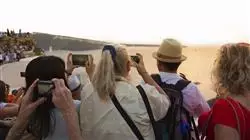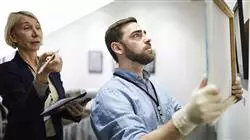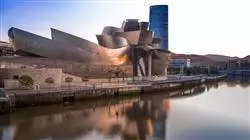University certificate
The world's largest school of business”
Why study at TECH?
Thanks to this unique Hybrid professional master’s degree, you will develop an analytical approach to identify tourism market trends and develop innovative strategies to stand out"

The challenge of running a tourism company in the era of globalization requires a multifaceted approach, ranging from managing cultural diversity to implementing advanced technology. In this situation, professionals need to enrich their practice with the most advanced strategies to foster an innovative and inclusive work environment that reflects the diversity of the global marketplace. In turn, managers need to enhance their leadership skills, strategic capacity and communication skills. Only then will they be able to implement practices that contribute to success in the management of tourism institutions.
In this context, TECH is launching a revolutionary Hybrid professional master’s degree MBA in Tourism Company Management. Designed by experts in this field, the curriculum will address in detail issues such as Cultural Heritage Management, public administration of tourist destinations or consulting and research. Also, the teaching materials will provide the graduates with the most sophisticated Advertising and Marketing techniques to position companies in the market, as well as to increase their visibility or improve the user experience.
Regarding the format of this university degree, it consists of two phases. The first stage is theoretical and is taught under a flexible 100% online format. In this sense, TECH uses its disruptive Relearning system to ensure a progressive and natural learning process that does not require long hours of study. Subsequently, the program includes a practical stay of 3 weeks in a reference entity linked to the Management of Tourism Companies. This will allow graduates to take what they have learned to the practical field, in a real work scenario in the company of a team of experienced professionals in this area.
This practical stay will provide you with the most innovative Marketing and Advertising techniques to position your Tourism Company in the market"
This Hybrid professional master’s degree in MBA in Tourism Company Management contains the most complete and up-to-date program on the market. The most important features include:
- More than 100 practical cases presented by professionals in Tourism Company Management
- Its graphic, schematic and practical contents provide essential information on those disciplines that are indispensable for professional practice
- Innovation-based approach to tourism projects
- Wide variety of marketing and advertising techniques to capture the interest of consumers and stakeholders
- Special emphasis on tourism law and legislation currently in force
- All of this will be complemented by theoretical lessons, questions to the expert, debate forums on controversial topics, and individual reflection assignments
- Content that is accessible from any fixed or portable device with an Internet connection
- Furthermore, you will be able to carry out an internship in one of the best companies
You will enjoy a 3-week intensive stay in a reference company, equipped with the most modern technological tools to optimize your work as a Manager"
In this Master’s proposal, of a professionalizing character and blended learning modality, the program is aimed at updating managers of Tourism Companies, whose functions require a high level of qualification. The contents are based on the latest scientific evidence, and oriented in a didactic way to integrate theoretical knowledge into managerial practice, and the theoretical-practical elements will facilitate the updating of knowledge and allow for strategic decision-making.
Thanks to its multimedia content elaborated with the latest educational technology, it will allow the Tourism Company Management professional a situated and contextual learning, that is to say, a simulated environment that will provide immersive learning programmed to specialize in real situations. This program is designed around Problem-Based Learning, whereby the physician must try to solve the different professional practice situations that arise during the course. For this purpose, the students will be assisted by an innovative interactive video system created by renowned and experienced experts.
You will have the best multimedia resources with which you will be able to enrich your learning and put what you have studied into practice in a much easier way"

You will incorporate to your usual procedures the most effective strategies to promote tourism services, taking advantage of the potential of social networks"
Teaching Planning
The teaching materials that make up this Hybrid professional master’s degree have been designed by experts in MBA in Tourism Company Management, taking into account the demands of the current labor market and the needs of consumers. Therefore, students will have access to 10 specialized modules with a practical approach that will provide them with an updated vision of the sector. The syllabus will delve into issues ranging from the management of cultural heritage or tourist destinations to tourism consulting and research. In addition, the program will provide students with the most sophisticated marketing techniques to attract more customers, generate more revenue and improve brand image.

TECH is a university at the forefront of technology, which puts all its resources at your fingertips to help you achieve business success"
Module 1. Cultural Heritage Management
1.1. Introduction to Cultural Heritage
1.1.1. Tourism and Cultural Heritage
1.1.2. Cultural Tourism Resources
1.2. Sustainability as a Reference in Tourism and Cultural Heritage
1.2.1. Concept of Urban Sustainability
1.2.2. Tourism and Cultural Sustainability
1.3. Hosting Capacity and its Application in Tourist Destinations
1.3.1. Conceptualization
1.3.2. Dimensions of Tourism Carrying Capacity
1.3.3. Case Studies
1.3.4. Approaches and Proposals for the Study of Tourist Carrying Capacity
1.4. Tourist Use of the Area
1.4.1. Flows of Visitors and Heritage Tourist Areas
1.4.2. General Patterns of Tourist Mobility and Use of the Area
1.4.3. Tourism and Heritage Sites: Effects and Problems Derived from Tourism Flows
1.5. The Challenges of Space Management
1.5.1. Strategies for Diversification of the Tourist Use of the Area.
1.5.2. Tourism Demand Management Measures
1.5.3. The Enhancement of the Heritage and Accessibility Control
1.5.4. Visitor Management in Heritage Sites with Complex Visiting Models Case Studies
1.6. Cultural Tourism Product
1.6.1. Urban and Cultural Tourism
1.6.2. Culture and Tourism
1.6.3. Transformations in the Cultural Travel Market
1.7. Heritage Preservation Policies
1.7.1. International Regulations
1.8. Management of Cultural Resources in Tourist Areas
1.8.1. Promotion and Management of Urban Tourism
1.8.2. Heritage Tourism Management
1.8.3. Public and Private Management
1.9. Employability in Cultural Tourism
1.9.1. Characteristics of Employability in Cultural Tourism
1.9.2. Training and Profiles in Cultural Tourism
1.9.3. The Tourist Guide and the Interpretation of the Patrimony
1.10. Case Studies of Successful Cases in the Management of Cultural Heritage in the Tourism Field
1.10.1. Strategies for Cultural and Tourism Development of the Local Heritage
1.10.2. The Associative Management of a Public Project
1.10.3. Visitor Analysis as a Cultural Management Tool
1.10.4. Local Policies of Tourist Dynamization and Great Cultural Attractions
1.10.5. Local Tourism Planning and Management in a World Heritage City
Module 2. Fundamentals of Marketing
2.1. Introduction to Marketing
2.2. Marketing in the Company: Strategic and Operational Marketing Plan
2.3. The Business Environment and the Organizational Marketplace
2.4. Consumer Behavior
2.5. Stages in the Consumer Buying Process
2.6. Market Segmentation in the Strategy of Organizations
2.7. Consumer and Industrial Market Segmentation Criteria
2.8. Supply– Demand Market Segmentation Assessment
2.9. Marketing Mix
2.10. Current Management Strategies for the Product Portfolio Growth and Competitive Marketing Strategies
2.11. Marketing Information System Components
2.12. Concept, Objectives, Applications and Sources of Market Research
2.13. Methodology to Conduct Market Research Studies
Module 3. Structure of Tourism Markets
3.1. Introduction to Tourism
3.1.1. Concept, Origin and Evolution of Tourism
3.1.2. Definition of Tourism
3.1.3. Types of Tourism
3.1.4. Tourism Product Life Cycle
3.1.5. Sustainable Tourism
3.2. Tourism Over Time
3.2.1. History of Tourism up to the 20th Century
3.2.2. Contemporary Tourism (20th and 21st century)
3.3. Tourism Planning
3.3.1. The Planning Process for Tourist Sites
3.3.2. Tourism Planning Tools: The Tourism Development Plan (TDP)
3.3.3. Sustainability as Tourism Planning Criteria
3.4. Economics of Tourism
3.4.1. The Tourism Production Process
3.4.2. The Importance of the Economic Effects of Tourism
3.4.3. Tourism Balance of Payments
3.5. Tourist Arrivals and Departures
3.5.1. International Tourist Arrivals and Departures
3.5.2. Tourist Destinations and Issuing Markets
3.6. Tourism Demand
3.6.1. Calculating Tourism Demand
3.6.2. Inbound Tourism
3.6.3. Outbound Tourism
3.6.4. Factors Conditioning Tourist Demand
3.6.5. Demand Seasonality
3.6.6. Trends in Tourism Demand
3.7. Module: The Tourist Offer
3.7.1. Analyzing Tourism Supply
3.7.2. Tourism Resource Supply: Natural and Cultural
3.7.3. Tourism Supply Related to Technological Innovations: New Business Models
3.7.4. MBA in Tourism Company Management applied to the Tourism Offering
3.8. The Company in the Tourism Industry
3.8.1. Concept of the Tourist Company
3.8.2. Types of Tourist Companies
3.8.3. The Tourism Business Environment
3.9. Introduction to the Main Tourism Sub-sectors
3.9.1. Hotel Sector
3.9.2. Catering Sector
3.9.3. Travel Agencies and Tour Operators
3.9.4. Air Transportation
3.9.5. Complementary Services
3.10. Market Structures in Tourism
3.10.1. Structure of the World Tourism Market: Globalization
3.10.2. Structure of the International Tourism Market
3.10.3. Structure of the National Tourism Market
3.10.4. Structure of the Regional Tourism Market
Module 4. Interactive Tourism Advertising and Communication
4.1. Introduction: A General Vision of the Internet
4.1.1. The Transformation of Tourism Business Models
4.2. Digital Marketing Fundamentals: Digital Strategy
4.2.1. Digital Marketing Strategies for Tourism Companies
4.3. Social Media and Networks: Facebook. Twitter. Instagram
4.4. Strategy and Content Management: Bloggers Wordpress Medium About.me
4.5. Digital Metrics: Web 2.0 Analytics
4.6. Mobile and Apps
4.7. Advertising and Digital Media
4.8. Search Engines SEO. SEM. Google AdSense Google AdWords
4.9. Communication 2.0 Online Reputation Community Management
4.10. E-Mail Marketing
Module 5. Quality Management and Innovation in Tourism
5.1. Service Quality Management
5.1.1. Quality of Service
5.1.2. Characteristics and Dimensions of Service Quality
5.1.3. Quality from the Customers' Perspective. Quality Levels
5.2. Tourism Quality Management
5.2.1. Quality Management Basics
5.2.2. Quality Management Systems
5.2.3. Quality as a Management Tool
5.2.4. Quality Management Systems
5.2.5. Total Quality Management Systems
5.2.6. National and International Quality Standards
5.3. Introduction to Quality: Concepts and Evolution
5.3.1. Service Quality in the Tourism Sector
5.3.2. Concepts of Quality
5.3.3. Evolution of the Concept of Quality
5.3.4. Dimensions and Principles of the Concept of Quality
5.3.5. The Quality Process for Internal and External Customers
5.4. Main Quality Theories
5.4.1. Theories of Quality Applied to the Tourism Sector
5.4.2. Total Quality Management (Deming)
5.4.3. Total Quality Management (Juran)
5.4.4. Total Quality Management (Crosby)
5.4.5. Total Quality Management (Feigenbaum)
5.4.6. Total Quality Management (Ishikawa)
5.4.7. Total Quality Management (Taguchi)
5.4.8. Total Quality Management (TQM) Applied to the Tourism Sector
5.5. Quality Costs in Tourism Companies
5.5.1. Concept and Classification of Costs Associated with Quality
5.5.2. Costs Arising from Failures
5.5.3. Reversal of Preventive Activities
5.5.4. Costs Generated by Monitoring and Evaluations
5.5.5. The Curve of Total Costs Associated with Quality
5.5.6. The Importance of the Management of Costs Derived from Quality in the Tourist Industry
5.6. Analysis, Diagnosis, Planning and Quality Control in the Tourism Industry
5.6.1. The Process of a Quality Tourism Service
5.6.2. Design and Implementation of a Quality Systems in Tourism Companies
5.6.3. Phases in the Process of Implementing a Quality System
5.7. Processes for the Implementation of a Quality and Environmental System
5.7.1. Interpreting Standards
5.7.2. Implementation of Processes and Quality Manuals
5.7.3. Quality Tools
5.7.4. Improvement Plans
5.7.5. Internal and External Audit
5.8. Tourism Quality
5.8.1. Quality in State and Regional Tourism Policy
5.8.2. UNE and ISO Standards in Tourism Quality
5.8.3. International Tourism Quality Standards
5.9. Quality Management in Tourism Services
5.9.1. Tourism Service Quality and Customer Perception
5.9.2. Techniques to Ascertain Customer Satisfaction
5.9.3. Online Reputation Management of Suggestions and Complaints
5.9.4. SERVQUAL Model Applied to the Tourist Company
5.9.5. HOTELQUAL Model
5.10. Innovation in the Tourism Industry
5.10.1. Innovation Management
5.10.2. Introduction to Innovation
5.10.3. Types of Innovation. Innovation in Management Processes
5.10.4. Innovation Management: Strategies
5.10.5. Standardization in R&D&I
Module 6. Consumer Behavior
6.1. Knowing the Market and the Consumer
6.2. CRM and Relational Marketing
6.3. Database Marketing and Customer Relationship Management
6.4. Consumer Psychology and Behavior
6.5. Areas of CRM Management
6.6. Consumer Centric Marketing
6.7. CRM Management Techniques
6.8. Advantages and Risks of Implementing CRM
Module 7. Advertising and Public Relations
7.1. Advertising and Public Relations: Conceptual Foundations
7.1.1. What Is Persuasive Communication?
7.1.2. Concept and Dimensions of Advertising and Public Relations
7.2. Historical Approach to Advertising and Public Relations
7.2.1. New Trends in Advertising Current PR Application Areas
7.2.2. Sponsorship, Patronage, Lobbying, and Publicity
7.3. Fundamentals in the Advertising System and Process
7.3.1. The Advertising Issuer: The Advertiser and the Advertising Agency
7.3.2. General Process Features
7.4. The Message in Advertising
7.4.1. Advertising Messages in Conventional Media
7.5. The Advertising Channel: Media, Support and Forms of Advertising
7.5.1. Conventional Media and Below the Line
7.6. The Receiver in Advertising: The Target Audience
7.6.1. Consumer Behavior: Conditioning Factors
7.7. Foundations of the Advertising Process
7.7.1. Strategic Planning in Advertising
7.7.2. Preliminary Phase: Briefing and Advertising Objectives
7.7.3. Creative Strategy: Media Strategy
7.8. Foundations of Public Relations Systems and Processes
7.8.1. The Public Relations Broadcaster
7.8.2. Public Relations in Organizations
7.8.3. Public Relations Companies
7.9. The Message in Public Relations
7.9.1. Drafting in Public Relations
7.9.2. Oral Expression in Public Relations
7.10. The Channel in Public Relations
7.10.1. Personal and Mass Media
7.10.2. The Receptor in Public Relations
7.10.3. Strategic Audiences in Public Relations
Module 8. Public Management of Tourist Destinations
8.1. Tourism Policy
8.1.1. Tourism Policy: Concept and Justification for Its Use
8.2. Administrative Organization in Tourism
8.2.1. The Political-Administrative Framework in Tourist Site Planning
8.2.2. Planning as a Function of Tourism Policy
8.3. Managing Tourist Destinations
8.3.1. Tourism Destination Management Models at Different Levels: Countries, Regions and States, Cities and Locations
8.4. The Importance of Governance in Management
8.4.1. The Perspective of a Tourism Policy with Community Participation
8.5. Local Tourism Management Models
8.5.1. Sectoral Instruments and Territorial Plans
8.5.2. The Tourism Territorial Planning Process
8.5.3. Territorial Tourism Plans: Case Studies
8.6. Tourism Observatories as Public Management Indicators
8.6.1. Macro-Tourism Reports
8.6.2. Qualitative and Quantitative Progress Reports
8.6.3. Specific Studies
8.7. Clusters and Innovative Business Associations (IBAs)
8.7.1. Definition of IBA Innovation Cluster
8.7.2. Advantages and Strategies of Belonging to an Innovative Cluster
8.8. Intelligent Tourist Destinations
8.8.1. Concept of ITD
8.8.2. Network of Intelligent Destinations
Module 9. Tourism Consulting and Research
9.1. Tourism Research
9.1.1. Sources of Information in the Tourism Sector
9.1.2. Techniques for Information Processing
9.2. Tourism Research Methodologies
9.2.1. Empirical Tourism Research: Scientific Method and the Research Process
9.2.2. Qualitative Approach: Tools
9.2.3. Quantitative Approach: Tools
9.3. Research Applied to Tourism
9.3.1. Treatment of Official Statistical Sources
9.3.2. Document and Image Analysis
9.4. Tourism Research Reports
9.4.1. The Research Project
9.4.2. The Research Report
9.5. Tourism Project Management
9.5.1. Analysis, Formulation and Implementation of Strategies
9.5.2. Market Research
9.5.3. Technical Study
9.5.4. Economic Study
9.5.5. Project Appraisal
9.6. Tourist Destinations
9.6.1. Design and Strategy of Tourist Destinations
9.6.2. Creation of Tourism Products
9.6.3. Research of the Tourism Market
9.6.4. Development of the Tourist Destination
9.6.5. Tourism Development Plan
9.7. Marketing of the Tourist Destination
9.7.1. Promotion of the Tourist Destination
9.7.2. Creation of Tourism Branding
9.7.3. Offline and Online Management of the Tourist Destination
9.8. Analysis of Strategic Management Cases
9.8.1. Strategic Partnerships
9.8.2. Adaptation to the Changing Environment
9.8.3. Technology for Tourist Destinations
9.8.4. Competitive Strategies in the Airline Industry
9.9. Tourism Consulting
9.9.1. Definition and Evolution of Consulting
9.9.2. Basic Concepts of Consulting Activity
9.9.3. Techniques of a Consultant
9.9.4. Project Management
9.9.5. Tourism Consulting
9.10. Destination Consulting Module
9.10.1. Destination Consulting Techniques
9.10.2. Tourism Business Consulting
9.10.3. Types of Actions
9.10.4. Identifying Business Opportunities
9.10.5. Product Creation and Marketing
Module 10. Tourism Law and Legislation
10.1. Introduction
10.1.1. Introduction
10.1.2. Concept of Tourism
10.1.3. Concept of Tourism Law
10.1.4. Tourism Legislation
10.2. The Law
10.2.1. The Source System
10.2.2. Concept of Law
10.2.3. Source System. Regulatory Hierarchy
10.2.4. The Law, Concept and Types
10.3. Features
10.3.1. Concept, Requirements and Types of Customary Law
10.3.2. General Principles of Law
10.3.3. Case Law and Analogy
10.3.4. Effectiveness of the Law, Ignorance of the Law and Fraud
10.4. Fundamental Institutions of Civil Law
10.4.1. Civil Law: Concept and Classes
10.4.2. Individuals and Legal Entities
10.4.3. Obligation
10.4.4. Contracts
10.5. The Company, the Entrepreneur and the Organized Economic Trader Commercial Companies
10.5.1. Commercial Law. Concept
10.5.2. Sources of Commercial Law
10.5.3. Company and Entrepreneur
10.5.4. The Social Entrepreneur
10.6. Tourism Legislation: Distribution of Responsibilities between the State and the Region in the area of tourism
10.6.1. Tourism Administration: Functions
10.6.2. Distribution of Competencies in the Area of Tourism
10.7. The Subjects of Tourism. Tourist Accommodations (I): Hotel Establishments
10.7.1. Introduction: Concept and Classification of Tourist Accommodation
10.7.2. Hotel Establishments
10.7.3. Basis for Classification of Hotel Establishments
10.7.4. First-Hotels Group
10.7.5. Second-Hotels Apartment Group
10.7.6. Third Group-Pensions
10.7.7. Hotel Specializations
10.7.8. The Director's Requirements
10.8. The Subjects of Tourism. Tourist Accommodations (II): Hotel Establishments
10.8.1. Tourist Apartments
10.8.2. Tourism Camps
10.8.3. Rural Lodgings
10.9. The Administrative Activity of Limitation in Tourist Matters. Tourist Inspection
10.9.1. Administrative Control of Tourism
10.9.2. Basis and Nature of the Tourist Inspection Power
10.9.3. The Tourist Inspector
10.9.4. Inspection Plans and Instruments
10.10. Tourism Contracts in Particular. Regulation and Content
10.10.1. Tourist Contracts. General Aspects
10.10.2. Package Travel Contract
10.10.3. Contract for the Acquisition of Timeshare Rights of Real Estate for Tourist Use
10.10.4. Contract for Individual Services
10.10.5. Contingent Reserve Contract
10.10.6. Tourist Insurance Contract
10.10.7. Hosting Contract
10.10.8. Hotel Management Contract

Make the most of this opportunity to surround yourself with expert professionals and learn from their work methodology"
Hybrid Executive Master's Degree MBA in Tourism Company Management
The tourism industry is one of the most dynamic and competitive sectors globally, requiring skilled leaders to manage and lead effectively. The Hybrid Executive Master's Degree MBA in Tourism Company Management from TECH Global University is designed for those who wish to excel in the management of tourism companies. This program offers a unique combination of online theory and face-to-face practices in a specialized center, providing a complete educational experience tailored to the demands of today's market. Blended learning classes allow students to access high-quality theoretical knowledge from any location, which is ideal for professionals looking to advance their careers without sacrificing their current job. Face-to-face internships complement this theoretical instruction, allowing students to apply the concepts learned in a real-world environment, which is crucial for developing practical skills in tourism management.
Specialize in tourism management
TECH Global University has structured this program to cover all the essential areas of tourism management, including financial management, tourism marketing, operations and human resources management. Through online classes, students will acquire a solid theoretical foundation, while face-to-face internships will allow them to face real challenges in the industry. This comprehensive approach ensures that graduates are well prepared to assume leadership roles in any type of tourism company. The faculty is composed of professionals with a recognized trajectory in the tourism industry, providing a practical and updated perspective that enriches learning. Interaction with these experts, as well as with other professionals and fellow students, fosters valuable networking that can be decisive for future professional development. Take advantage of the opportunity to transform your career and become a leader in the tourism sector with the Hybrid Executive Master's Degree MBA in Tourism Company Management.







